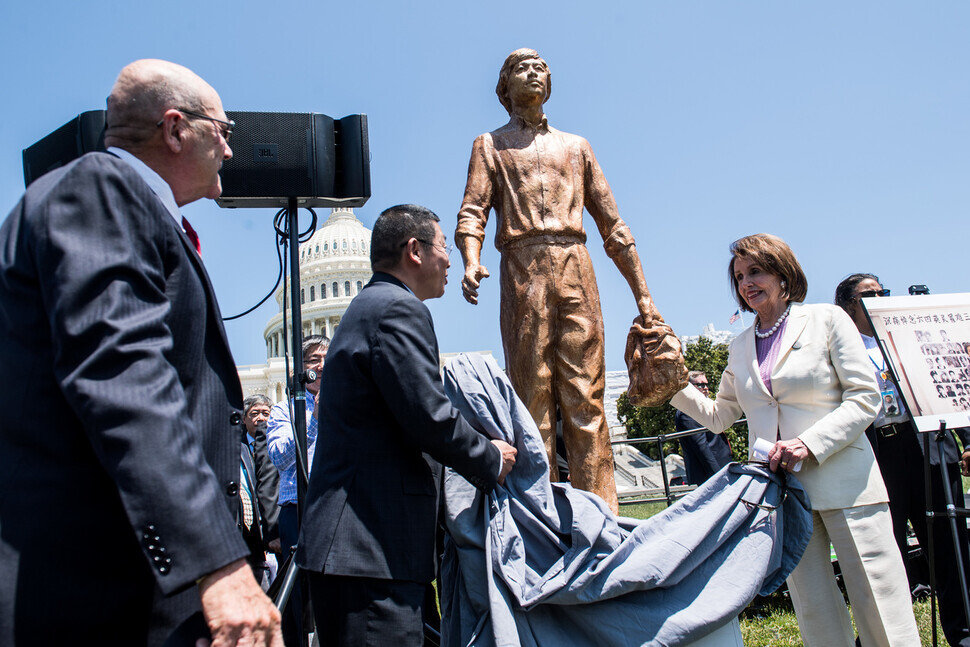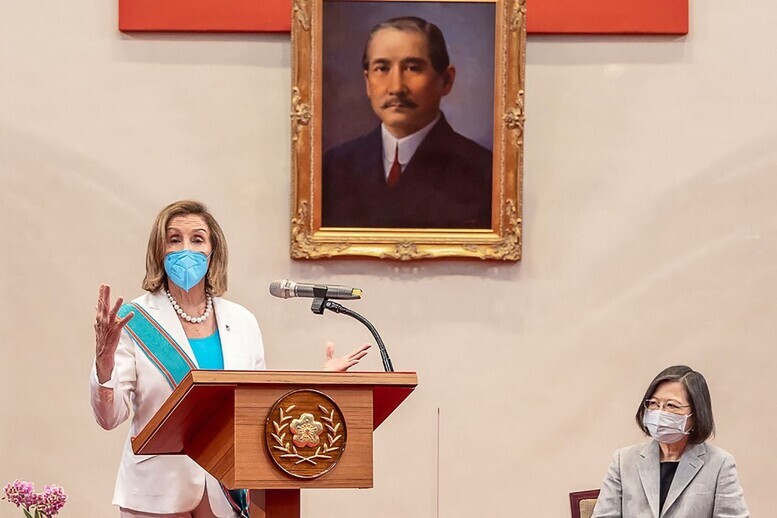hankyoreh
Links to other country sites 다른 나라 사이트 링크
Pelosi’s trip to Taiwan: Standing up to China or personal legacy-building gambit?

The visit to Taiwan by 82-year-old US Speaker of the House Nancy Pelosi has emerged as a critical issue in US-China relations. Considering that she visited Taiwan to deliver a hard-line message to China despite US President Joe Biden’s attempts to dissuade her, many are curious about what public and private motivations lie behind her insistence.
Shortly after arriving in Taiwan at 10:44 pm on Tuesday, Pelosi issued a statement in which she said her visit was aimed to support “Taiwan’s vibrant democracy.”
“America’s solidarity with the 23 million people of Taiwan is more important today than ever, as the world faces a choice between autocracy and democracy,” she added.
In an opinion piece published in the Washington Post on Tuesday, Pelosi underlined her intention to “stand by” Taiwan “in the face of the Chinese Communist Party’s (CCP) accelerating aggression.”
The speaker also criticized “the CCP’s brutal crackdown against Hong Kong’s political freedoms and human rights,” as well as its oppression of the Tibetans and Uyghurs.
In short, Pelosi has declared resolute resistance against the CCP, which she regards as a bastion of autocracy in the global struggle between autocracy and democracy.
Pelosi’s opposition to the Chinese government and the CCP has stood out even in the US Congress, which is home to many China hawks. Her campaign began with a bang when she held up a banner reading “To those who died for democracy in China” with other US representatives at Tiananmen Square, Beijing, in 1991, four years after being elected to the House of Representatives.
Later, she was a leading opponent of giving China most-favored-nation status and admitting it into the World Trade Organization. She sent letters protesting human rights issues to Chinese leaders who visited the US and visited China to request the release of political prisoners in 2009 during her first stint as speaker of the House.
Pelosi also urged the leaders of various countries to boycott China during the Beijing Olympics this past February. Her keen interest in China is apparently linked to the large population of Chinese Americans in her district in San Francisco.
In that sense, Pelosi’s recent visit to Taiwan lines up with her consistently uncompromising stance on China. The Washington Post said her visit “marks the culmination of a 35-year career spent as an outspoken critic of China.”

But considering that Pelosi went ahead with her trip after Biden basically advised her not to with his remark that military officials believed it was “not a good idea,” some think Pelosi may be driven by personal ambition. While leadership over foreign affairs is supposed to lie with the US president, Pelosi has reportedly refused to bend, citing the independence of the legislative branch.
American media have surmised that Pelosi probably wants to have a historic impact on an issue she has stuck with during her 35-year career in Congress as a US representative, including a total of seven years and six months as House speaker. The Los Angeles Times said that Pelosi expects her visit to Taiwan will go down as her greatest achievement in her long career as a critic of China.
Pelosi may have concluded that if she fails to take this opportunity, she won’t have another like it.
She had tried to arrange a visit to Taiwan in April, but had to postpone that after contracting COVID-19. If she’d delayed her trip once again until after the midterm elections in November, there’s a good chance she’d no longer be House speaker. While she had announced her plans to run for a 19th term as representative, the Democratic Party is widely expected to lose its House majority in the midterms. Even if it wins, she won’t find it easy to maintain her position as House speaker.
In relation to that, one Taiwanese media outlet reported that when the Taiwanese government told Pelosi it wanted to rescind its invitation, Pelosi responded that she probably wouldn’t have another good opportunity. While that was denied by the Taiwanese government, the story does correspond with speculation that Pelosi’s visit is largely intended to build her legacy.
By Lee Bon-young, Washington correspondent
Please direct questions or comments to [english@hani.co.kr]

Editorial・opinion
![[Column] Season 2 of special prosecutor probe may be coming to Korea soon [Column] Season 2 of special prosecutor probe may be coming to Korea soon](https://flexible.img.hani.co.kr/flexible/normal/500/300/imgdb/original/2024/0426/3317141030699447.jpg) [Column] Season 2 of special prosecutor probe may be coming to Korea soon
[Column] Season 2 of special prosecutor probe may be coming to Korea soon![[Column] Park Geun-hye déjà vu in Yoon Suk-yeol [Column] Park Geun-hye déjà vu in Yoon Suk-yeol](https://flexible.img.hani.co.kr/flexible/normal/500/300/imgdb/original/2024/0424/651713945113788.jpg) [Column] Park Geun-hye déjà vu in Yoon Suk-yeol
[Column] Park Geun-hye déjà vu in Yoon Suk-yeol- [Editorial] New weight of N. Korea’s nuclear threats makes dialogue all the more urgent
- [Guest essay] The real reason Korea’s new right wants to dub Rhee a founding father
- [Column] ‘Choson’: Is it time we start referring to N. Korea in its own terms?
- [Editorial] Japan’s rewriting of history with Korea has gone too far
- [Column] The president’s questionable capacity for dialogue
- [Column] Are chaebol firms just pizza pies for families to divvy up as they please?
- [Column] Has Korea, too, crossed the Rubicon on China?
- [Correspondent’s column] In Japan’s alliance with US, echoes of its past alliances with UK
Most viewed articles
- 1Is Japan about to snatch control of Line messenger from Korea’s Naver?
- 2‘We must say no’: Seoul defense chief on Korean, USFK involvement in hypothetical Taiwan crisis
- 3[News analysis] Using lure of fame, K-entertainment agency bigwigs sexually prey on young trainees
- 4[Column] Park Geun-hye déjà vu in Yoon Suk-yeol
- 5Will NewJeans end up collateral damage in internal feud at K-pop juggernaut Hybe?
- 6Up-and-coming Indonesian group StarBe spills what it learned during K-pop training in Seoul
- 7[Column] Season 2 of special prosecutor probe may be coming to Korea soon
- 8Korea’s 1.3% growth in Q1 signals ‘textbook’ return to growth, says government
- 9Report reveals toxic pollution at numerous USFK bases
- 10[Editorial] Statue should not be central concern of comfort women issue